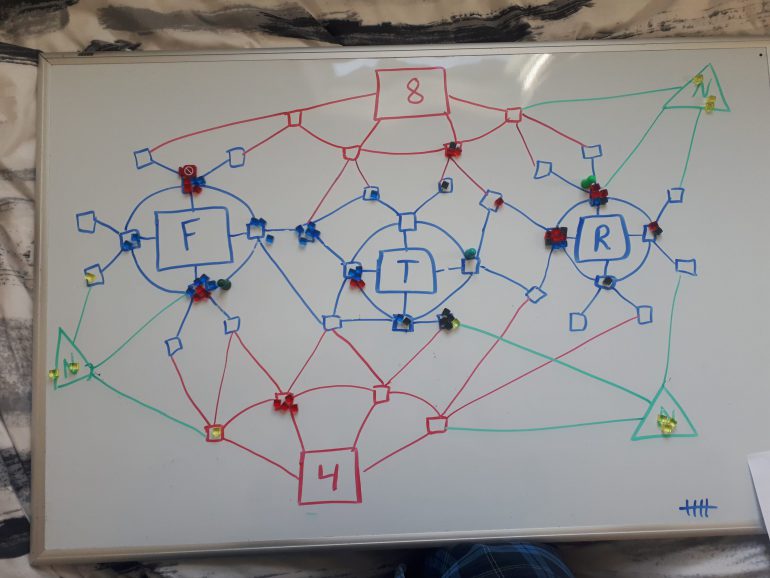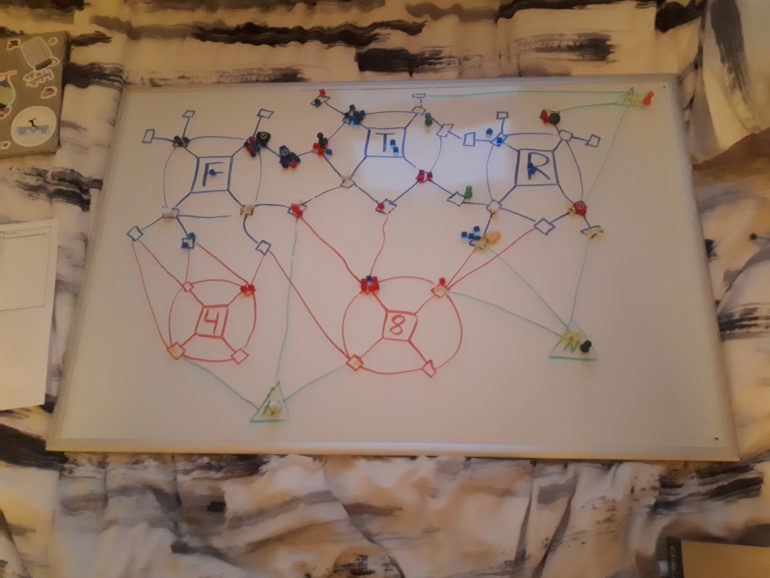Many times I have heard the phrase, “Disinformation War”. Referencing the battle over information and truth online, this battle involves an array of actors that converge around the content we see on our news feed. Fact checkers, conspiracy theorists, and Russian bots are some of the commonly referenced units that slug it out on a digital battlefield. However, these relationships are complex, and understanding how information flows and becomes contested online can help us better approach our own engagement with content. To help participate in creating educational approaches to discuss disinformation I am working, with the support of TAG, on a serious wargame presenting disinformation.
Still in its early stages, the game is going to abstract some of these digital information flows into a board game that simulates online disinformation. Currently being playtested for four people, players will play as a different actor either working to stop the spread of disinformation or help propagate it further. This means that play is asynchronous and partially collaborative but the goal is to help simulate information networks. Through the games, players are able to watch as their crafted conspiracy theory spreads through and infects a mainstream social media site, or work tirelessly to stop the content from taking over a network.
Despite it being titled a wargame and my starting point for this post referencing the “disinformation war”, the game is not going to show combat in any way. In fact, framing disinformation as a war is misleading since the spread of fake news is not a set of battle grounds but rather a contest for visibility and virality within a network. In other words how many users will be exposed to – or see – the content. I employ the terms ‘virality’, ‘infect’, and ‘expose’ intentionally to reference a change in discourse from a disinformation war to a battle of disinformation ecology. An article by Poynter Institute, who actively train fact checkers suggests that an ecological media view better encapsulates the challenges we have with disinformation sharing online (Tardáguila et al., 2019). An ecology view suggests a need to manage disinformation and not fight it. From this perspective, it becomes easy to compare disinformation as a virus (Graham et al., 2020), an analogy only made more apt in the context of the COVID-19 pandemic.
Keeping this in mind with my playtest design I have drawn inspiration from existing games such as Pandemic. Pandemic asks players to move around the board and stop a virus. The board is covered in different cities and players watch as a virus slowly spreads between them. Taking this into consideration, my current prototypes are using ‘nodes’ to represent different social media forums, image boards of communities, and players are active in choosing where to spread disinformation or where to try and stop it. With TAG’s support, I will be working with a designer to figure out how to make the abstract space of the digital visually accessible for players. My current playtest iterations have been using a white board to think through different networks and regions, and you can see my ‘beautiful’ phone photos of them below.


The project is still in its early stages and I expect that much will change. I plan on having a playable offline and online prototype ready for the end of April and will provide another update when that is done. For now, things are too up in the air to get specific, but I hope that the game is a good mix between educational, enjoyable, and accessible (I hope the game will be accessible for ages 12 and up). If you want to stay updated on my work with the project (or the other things I do) you can follow my personal blog at stratagem.blog or my twitter @SWBdejong.
References:
Graham, T., Bruns, A., Zhu, G., & Campbell, R. (2020). Like a virus: The coordinated spread of Coronavirus disinformation. The Australia Institute. https://apo.org.au/node/305864
Tardáguila, C., Funke, D., & Benkelman, S. (2019, December 5). Taking an ecological approach to misinformation. Poynter. https://www.poynter.org/fact-checking/2019/taking-an-ecological-approach-to-misinformation/
